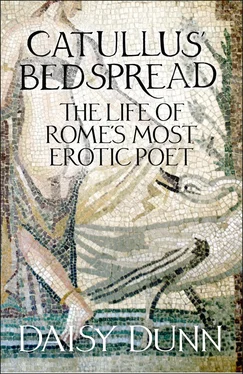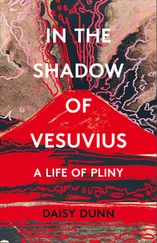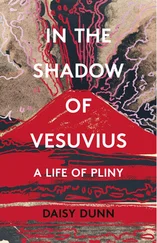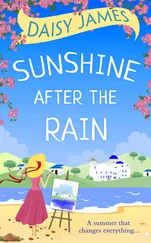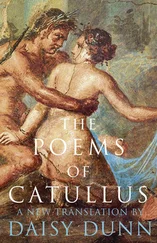Perhaps it is because our ideas about ancient poetry are so coloured by the awe-inspiring epics of Homer and their lofty themes of humanity that many of Catullus’ poems seem so surprising and immediate. While some of his poems are highly learned and erudite, others are mischievous, goatish, direct. With characteristic boldness, he requests a woman he loves to:
Give me a thousand kisses, then a hundred
Then another thousand, then a second hundred.
Then – don’t stop – another thousand, then a hundred …
(Poem 5)
In Latin these lines begin so abruptly – da , dein , deinde – it is as if we hear them with Catullus’ quickening heartbeat. I was seventeen when I first discovered them, and they made Catullus feel more alive to me than any other poet I knew. I have read them hundreds of times since, and they still have the same effect.
One of the reasons Catullus’ poems are still so readable I think is that they show that the people of his world were not always so very different from us. The characters he encounters and describes in the streets and bawdy inns of Italy call to mind the stock cast of a Roman comedy – or even a scene in late-night Soho – teeming with heartbroken lovers, drunken cavorting youths, old men pining for women a fraction of their age, money-grabbing brothel-keepers, mercenary meretrices (prostitutes), slaves who know too much.
Catullus’ immense skill as a poet lay in his ability to combine many literary genres in the Latin tongue, not just elements of comedy, but the clarity of Sappho, the celebrated female poet, the compact and erudite style of Hellenistic poets, and the wit of lewd graffiti in Rome, with themes as various as love, the writer’s life, and the myth of Jason and the Argonauts. The Roman province of Macedonia incorporated much of mainland Greece, and in Catullus’ day Greek culture had well and truly permeated Rome’s own.
While never enslaved to his Greek predecessors, when he wanted to be particularly learned, Catullus adapted their poetic ideas to convey them with new feeling. He forged new Latin words and was partial to diminutives ( miselle passer – poor little sparrow; scortillum – little tart). He feverishly combined elegantly phrased sentiment with colloquialism and obscenity, unnerving the more serious Romans who believed that a jibe at one man’s sexual inadequacy was what high-spirited youths scribbled on walls and brandished in tense moments, not what educated writers preserved in fine papyrus scrolls. His work would therefore prove unsettling for some of the older generation, as well as important public figures such as Cicero, the great orator, who had rather conservative tastes.
Such readers in Rome were used to epic and chronicles and meandering excursus on the history that made Rome august. They had the patience to work through manual-like offerings on farming, if not to write them. Prior to Catullus, a cluster of poets, including the little-known Laevius and Valerius Aedituus, had tried to capture the liveliness of the Greek poets in Latin, but their attempts would not generally prove as successful as his; their names are obscure today as a result of the poor survival of their work. Catullus did not shirk sobriety, but framed it unexpectedly and with a finesse of the kind that many of his literary predecessors lacked.
The apparent simplicity of Catullus’ poetry often masks far greater, deeper sentiment and subtlety of thought. He helped to shape the genre of Latin love elegy by writing a sustained series of poems to a lover. Ovid, Virgil, Horace, Propertius, Tibullus: all were influenced by his work. So Ovid, in a book of love elegies, confessed that he had a wandering eye and could not help but feel attracted to many different women: ‘I hate what I am but, though I long to, can’t fail to be what I hate.’ 2It is a striking line, but partly because it is a response to one of Catullus’ most remarkable poems which begins: ‘I hate and I love’ (Poem 85). The Latin love-poet Propertius, who was about thirty years younger than Catullus, pledged that his poetry would make the beauty of his mistress Cynthia most famous of all, ‘ pace Catullus’. 3Catullus remained a monumental figure of reference for the poets who sprang up over the decades following his death.
In his pithy observations of day-to-day life and bitter polemic against his enemies, Catullus also pre-empted the great satirists of the Roman Empire, particularly the writers Martial and Juvenal. He called his poetry nugae (‘ramblings’, or ‘sweet nothings’) partly out of false modesty, but with the understanding that the word also meant ‘mimes’. 4Many of his poems offer vignettes, at once silent and resounding with the colourful characters he observed.
There are secrets and allusions in Catullus’ Latin which take some teasing out, but once found, throw Catullus’ poetry in a more dazzling light than one could ever have imagined. As soon as I realised this, I decided that I wanted to know Catullus, to read his work with the emotion with which it was written, to get as close as I could to this man who lived more than two thousand years ago. And so I began to write this book, which I hope will inspire others to discover, or rediscover, his exquisite poems.

There are very few surviving sources for Catullus’ life. Practically everything that can be known about him must be extracted from his book of poetry. This may resemble a series of jumbled diary entries, describing episodes from his life, but Catullus wrote it for public consumption, and not necessarily as a faithful account. He addressed love poems to a certain ‘Lesbia’, for example, a woman he gave life to through his verse. Lesbia was a pseudonym for Clodia Metelli, the eldest sister of a wealthy and influential politician in Rome. 5
Of the 117 poems which survive in his collection, none bears a title. They are traditionally numbered according to the order in which they appeared in the earliest manuscripts, which is neither chronological nor entirely thematic, but hardly random either. Like a good music album, there is style in the progression and unexpected swing of one story to another, back and forth in time. It might have been a poet who established the poems’ order.
Catullus was much more than a love-poet. His poems to Lesbia form only a fraction of his book. The longest and most accomplished poem that survives, Poem 64, makes no explicit mention of her at all, focusing instead on a luxurious bedspread. I like to call it Catullus’ ‘Bedspread Poem’ because it contains as its centrepiece a long, digressive passage on the myths that adorned the wedding bedspread of one of Jason’s Argonauts. In it, Catullus set the themes of love and war against the backdrop of the myth of the Ages, a sequence of five eras against which writers of ancient Greece and Rome mapped their semi-mythical history. 6
The first of these eras was the Golden Age, an idyllic, Garden of Eden-like time when there was no work, no war, no sickness, no travel; the earth gave freely and amply of its own accord, and gods and men lived harmoniously. There followed an inferior Silver Age, which Jupiter, king of the gods, destroyed since its people were criminals who no longer offered sacrifice to the gods. A Bronze Age came about, dominated by warfare and weaponry. Its people destroyed each other. Then followed the Heroic Age, which offered a reprieve from the decline, a time of heroes descended from the gods themselves, warriors who fought in the Trojan War, and Jason and his Argonauts. When they died, an Iron Age arrived. It was the worst of the five eras, an age of anxiety, pain, hard work, and murder. The Iron Age myth was a fitting tribute to the grim realities of late Republican Rome.
Читать дальше
